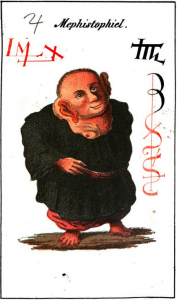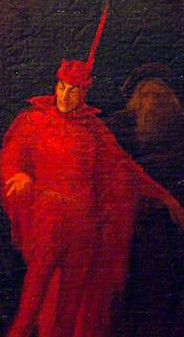
The Satanic minions who really run this place are peering over my shoulder as I write, so bear with me.
First off: Mephistopheles is not the Devil. He’s Mephistopheles or Mephisto. He’s a devil or a demon, but he’s not the Devil.
Secondly, there is no Mephistopheles before the Faust books. He’s not a Biblical creature and didn’t come out of ancient Middle Eastern religions that Christianity (or some earlier religion) might have demonized. He wasn’t a competing tribe’s god and doesn’t appear in the Bible, except perhaps, as Judas.
He appears as Faustus is giving in to temptation, using demonic magic to summon him. But it seems Mephistopheles is not summoned; he was just passing by. Faust has no powers over Mephistopheles, but both are gentlemen and each agrees to service under a contract. Mephisto will serve Faust for a time, and then Faust will go to Hell. For Faust, it’s a fair price to pay. Hell can’t be all that bad, and twenty four years of life are invaluable.
While eternity is forever, life is for at best a hundred years. It seems like an unbalanced trade, except that life in hand is most precious. Of all of eternity, Faust has twenty four years to accomplish all he wants to accomplish. While we can’t speak for Faust, it still seems like a stupid trade, but we don’t have Faust’s ambition, and Faust was arrogant and proud.
Anyway, the minions are asleep now, so we can continue.
They are, in truth, a little bit proud of Mephisto, because he makes them famous, but at the same time they are dismissive of him, because he is only a product of the Renaissance, and for a purported demon, is very young, whilst real demons are very old.
And of course, it is Mephistopheles whom Faust meets. It is Mephistopheles to whom Faust barters his soul. It is Mephistopheles who gets famous.
What really gets the minions, perhaps, is jealousy that Mephistopheles should have risen so far making a nuisance of himself that people think he’s the left hand of Satan (who Christians identify with a Lucifer mentioned in the Bible), and they think he was there at the Fall, when Satan was ejected out of heaven along with his co-conspirators – but he wasn’t.
Even his name is suspect: “Mephistopheles” reflects poorly on “Lucifer.” They say that Lucifer was Satan’s angelic name before the Fall. It means Bringer of Light, or the Morning Star. Mephisto must be pandering for Lucifer’s attention when he names himself, for he is, by some interpretations, the Hater of Light.

It is the height of Renaissance arrogance and aspiration that a “prince” of demons would take an interest in Faust’s soul and that they should come to an agreement. That suggests Faust is at a level equivalent to Satanic royalty. Is Faust like Satan thinking he’s equal to God?1 Is Faust the equivalent of Jesus or Muhammad? Of course not: he’s a weak, all-too-human wannabe.
The demon horde will tell you that Mephistopheles’s a fraud too, that no demon or devil for that matter would be such a publicity seeker that he would appear like that to a human, “conjured” or not. It’s too dangerous. Against evil we all flock to God. In the ages around Faust, terror of the unrestrained Devil living among us, and we defenceless (Protestants more so than Catholics in that regard), already had everyone scared religious, and tens of thousands or more “witches” were slaughtered in a Christian purge of the mostly-innocents – all of whom you would expect a Christian God would apologize for with a free salvation in heaven.
For a real demon, any publicity is bad publicity. Faust was written as a morality play – written by a good Christian with the calculated effect of scaring people away from the Devil and his minions (shout out to my demons!) and back to God by teaching them the bad results of being tempted by the Devil, or of tempting him. The danger of straying from God is shown. Mephistopheles is the writer’s pawn.
The early Fausts show the simple consequences of pride, ambition, God-less arrogance, and dallying with demons. Clearly Mephistopheles was invented by a good Christian to divert people away from the Devil, so Mephisto is really no friend of Satan.
But you may object, and say that Lucifer himself was invented by good Christians to scare people straight, but you don’t tell demonic minions that Lucifer is logically a good Christian himself, certainly not after their nap when they’re especially cranky. And whoever that puppet Lucifer is, you can’t say that about Satan as we’ve come to know him. He’s not a good Christian by present-day good Christian standards. Satan comes from old stock – religions far older than Christianity and even Judaism. Satan isn’t from a Christian morality play. The ideas of the old religions that Satan represents (dualism for example) are a real threat to Christianity should they ever get loose again. More people have been destroyed to crush those ideas than simple witches. Christianity won’t brook any competition or muddying of the message. Mephisto is just a itinerant soul-monger compared to Satan.
